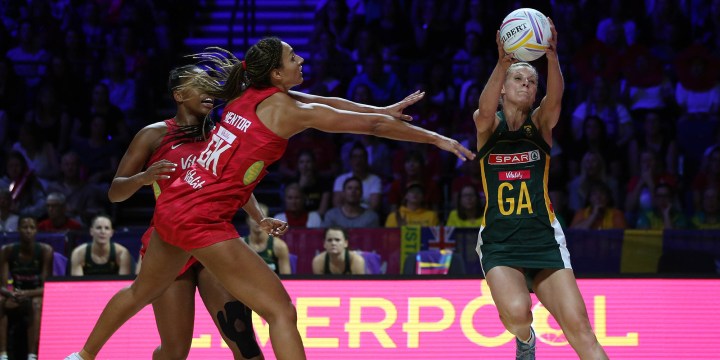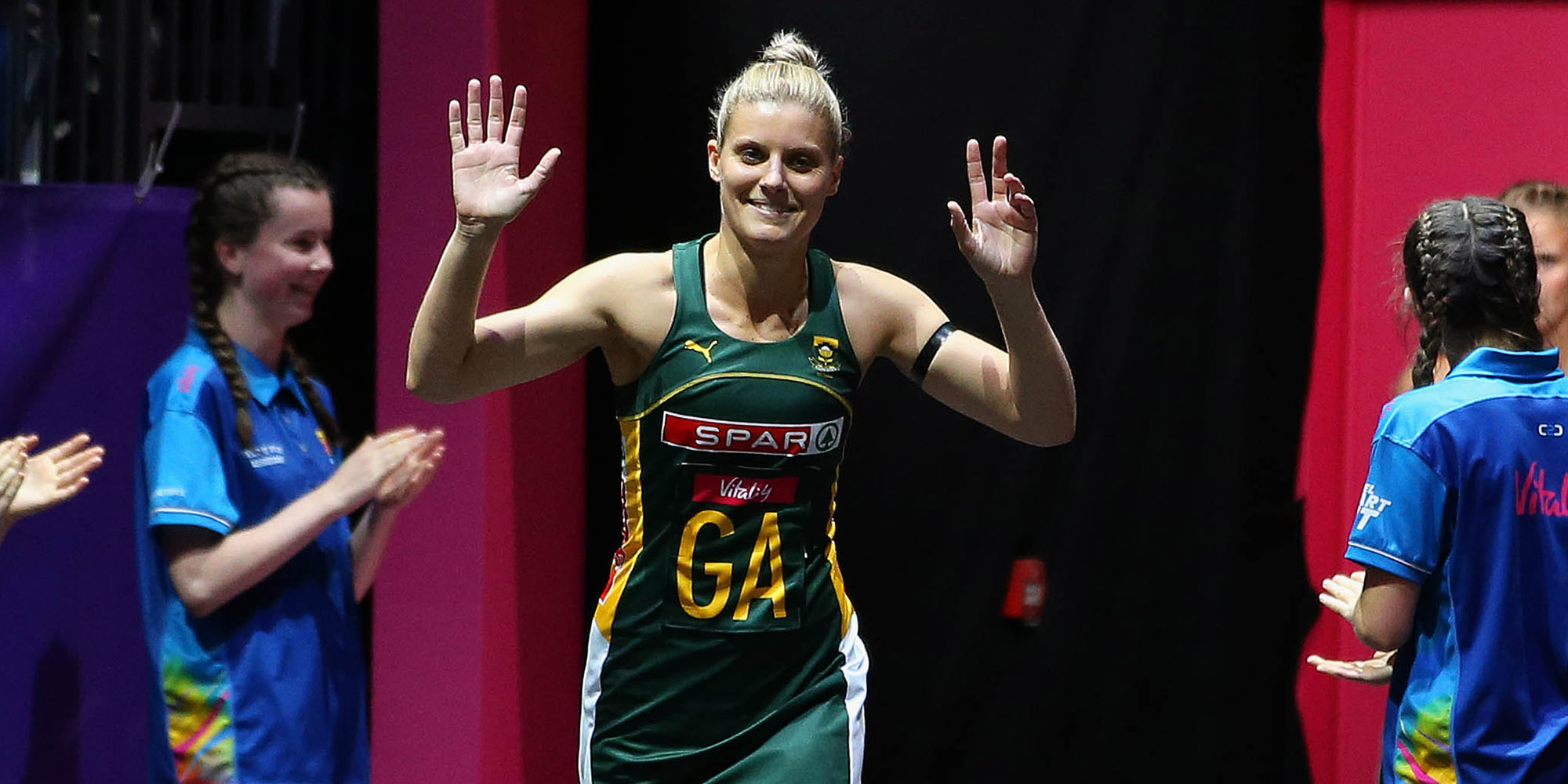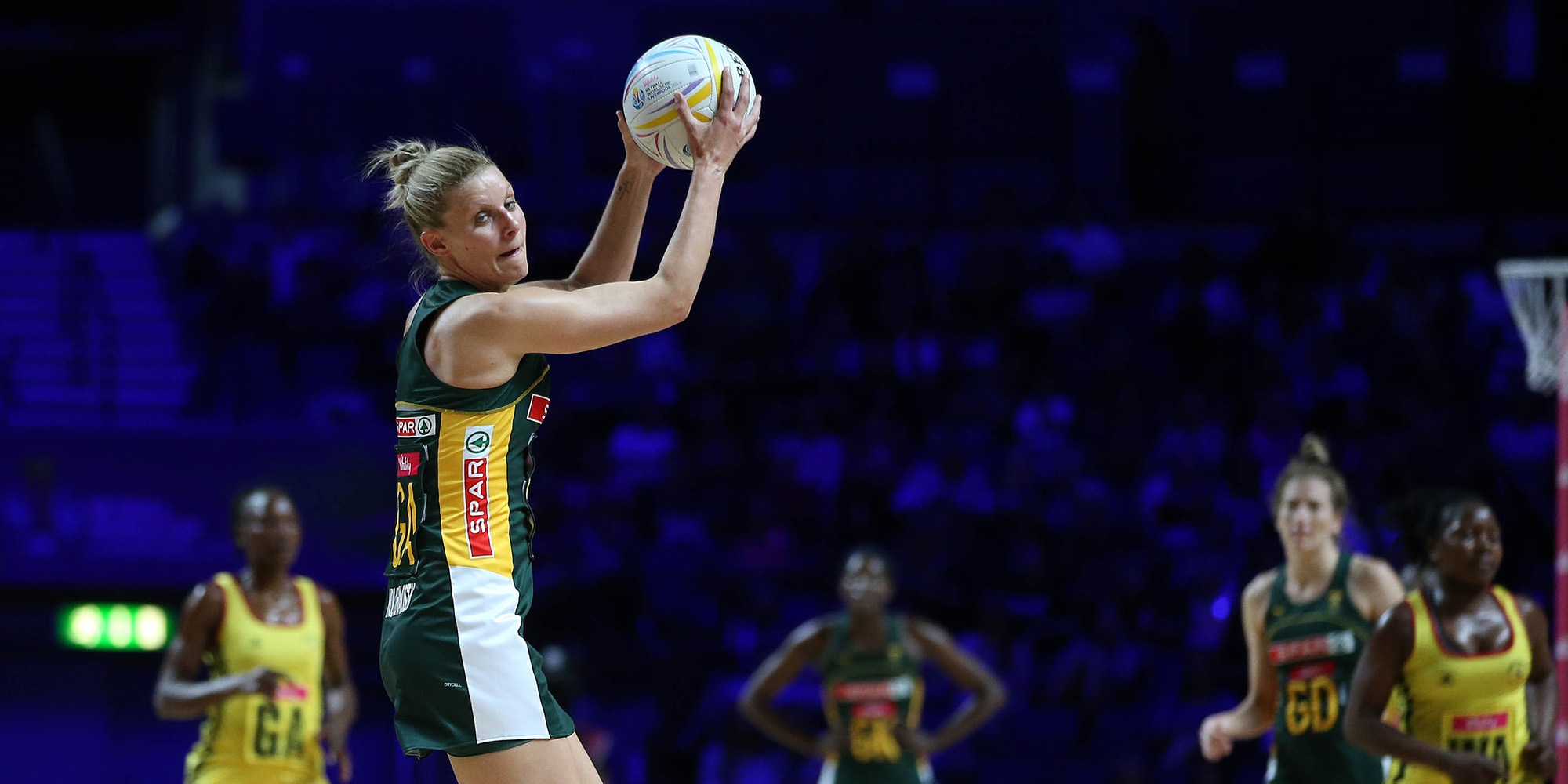SPORT
Mind the gap: Women’s pay under the spotlight as Maryka Holtzhausen retires from netball

It’s the biggest women’s sport in the country. But netball superstar, Maryka Holtzhausen, did it for the love of the game, not for love of money (and there isn’t very much of that around).
An illustrious international sporting career has come to an end. Not Hashim Amla or Imran Tahir, whose feats have been regularly lauded in the local and international press, but Maryka Holtzhausen.
For those who don’t follow the game of netball (which is the largest women’s sport in the country), Holtzhausen has been something of a trailblazer. She played in Protea colours 116 times, after becoming only the second player in SA netball history to pass the century mark. She was captain of the side for many of those and was the first player from the country to be selected to compete in England’s professional league, playing one season for Loughborough Lightning and two for the Severn Stars.

LIVERPOOL, ENGLAND – JULY 18: Maryka Holtzhausen of the SPAR Proteas takes to court during the Vitality Netball World Cup match between South Africa and England at M&S Bank Arena on July 18, 2019 in Liverpool, England. Photo: Reg Caldecott/Gallo Images
Yet very little was made of the talented goal attack’s retirement from the game at the age of 32. There were a couple of mentions in the media, but most of the accolades came via her team mates and friends on social media.
It’s easy enough to compare just how different the response would have been, had Holtzhausen been a male rugby, cricket or soccer player. Try Googling “Hashim Amla retires” and “Maryka Holtzhausen retires” and spot the disparity. But it’s not only the media coverage that differs. There are financial implications, too.
Cricketers are some of the best looked-after sportspeople in the country when it comes to retirement.
As Chief Executive of the SA Cricketers’ Association (SACA) Tony Irish explains: “All Proteas, men and women, and franchise players are members of a provident fund which provides for retirement. The longer you play and are a member, the increase in the benefit. SACA provides for extended medical aid cover into the first year after retirement.
“SACA’s player education and personnel development programme (called SACA Player Plus) allows players to continue studies which they started while playing to continue after retirement. SACA encourages all players to study while playing in order to prepare themselves for retirement. SACA continues to pay commercial rights payments to players in their first year of retirement.”
Other male-dominated sporting codes such as rugby have similar support systems, with pension schemes, and injury benefits in place, and those playing professional sports in this country at least earn enough during their careers to set them up comfortably. SA Netball, which has outperformed several of those sports at international level, has none of that.
But for Holtzhausen, the last 12 years of international competition have not been about the accolades or the money. They simply couldn’t have been, in a sport she knew was not a professional one from the start.
“It is not frustrating at all. I always knew I wouldn’t be able to ‘retire’ after netball, it was never about the money. Yes, the guys might have it a little easier, but now I have the opportunity to work hard at something else. Life is all about keeping the balance,” she said.
She also doesn’t like being compared to male sports stars and had already planned for a future beyond the international game, heading back to the University of the Free State in Bloemfontein to work as a sports administrator.

LIVERPOOL, ENGLAND – JULY 17: Maryka Holtzhausen of the SPAR Proteas in action during the Vitality Netball World Cup match between South Africa and Uganda at M&S Bank Arena on July 17, 2019 in Liverpool, England. Photo: Reg Caldecott/Gallo Images
“Coverage is bigger for male sportsmen all the time, and that’s no different when they retire, but I do not like comparing us to the men. We are women, we are different, and we are working hard for more than just media coverage.
“It is definitely changing – no doubt about it. Female sports are generating a higher profile by the work behind the scenes from administrators and the results on the field by the athletes. We are definitely heading in the right direction.”
The gender gap remains an obvious one though, with even contracted women cricketers not enjoying the same benefits as their male counterparts.
SACA’s Irish explained: “The women Proteas also have provident fund benefits on retirement, medical aid support and access to SACA Player Plus. As women’s cricket has only been professional in SA for the last four years these are all quite new.
“We have advocated for ‘parity of benefits’ between men and women cricketers which means that the women should have the same type of benefits even though they may not always be at the same financial level. We are realistic and understand that the commercial level of professionalism is different between the men’s and women’s games and that this is a factor. We will, however, continue to push for improved benefits for our women cricketers as the women’s game grows in SA and globally,” he added.
Former Proteas netball captain Elsjé Jordaan believes sometimes those within the sports have sold themselves short in the past.
“I think there’s such a difference because of women undervaluing their sport and not acknowledging contributions. I remember asking our manager if I could take my bib after my final series (knowing it was my last) and she almost had a fit as then I would be breaking the set. I don’t think a lack of money has anything to do with appreciating your own.”
Jordaan remembers there was little acknowledgement back in 2004 when she finally called it quits on her international career, which had spanned five years, with her earning 88 caps for the country.
“The only response was most probably from friends and family and fellow players locally and the friends you made playing internationally. Nothing official was ever set up for us by Netball South Africa when we announced our retirements – that is true for all players playing in my era.
“I can’t remember anything in the media either. It was a case of one day you were there and then you weren’t,” explained Jordaan, who went on to complete a PhD and start her own business.
“We did not earn anything while we were playing so had no savings available afterwards. It is really sad but we never sulked about it. When we played, we just got on with the job. The players who played with me that are still around in netball are all obviously advocating for professionalism in women’s sport, since we really do understand the sacrifices it took. And hopefully when and if netball turns professional the sacrifices of former players and officials will be recognised.”
Looking back at her retirement from the game, there is still a degree of disappointment.
“Taking into consideration that I was also the SA captain when I decided to retire, if it was a male sport I could see how my family would have been invited to my last game or to a tribute match. Maybe some kind of memorabilia would have been handed over with my bib, and an action photo acknowledging my contribution, number of tests and years representing my country.
“I attended a luncheon in Australia where former Australian Diamonds [national players] received a necklace with a small diamond and their number. I thought that was so cool and I was actually so sad knowing that we don’t even get invited to official test matches in SA as former Proteas.”
Often the lack of these sorts of tributes comes down to financial constraints, but things are at least changing, with President of Netball South Africa, Cecilia Molokwane, confirming recently she is planning for the sport to turn professional by 2021. It’s not an unrealistic target considering the massive sponsor interest after the Proteas’ performance at the recent World Cup in Liverpool, where they beat the second-ranked team in the world and eventually finished fourth. The SA World Cup squad also, for the first time, received R1.2-million from team sponsor Spar to be shared among them for their excellent performance in England.
For Holtzhausen, a switch to full professionalism will unfortunately come too late, but she has no regrets, and at least managed to play in a professional league for several seasons, unlike her predecessors.
“It’s something I have been thinking about for a while. I think every athlete reaches a point in their career where they feel it is time. I knew I was definitely not going to play another World Cup and it just seems right to finish on the high of the recent one.
“To be honest it still feels very unreal. At the moment it just feels like I am on a break, but I have my very sad moments of realisation and I believe there are going to be many more, especially when my life returns to normal. Well, my new normal.
“There have been countless highlights, but playing in three Commonwealth Games, three World Cups and captaining my country for a few years definitely stands out. And I can’t leave out all the people I’ve met along the way.
“I’m finishing with 116 caps and I was probably just as nervous in the last one as the first one. I don’t think I ever got less nervous, I just controlled it better. Both occasions and every single one in between was an honour and privilege and I am very proud to have had the opportunity to represent my country.”
Holtzhausen is now enjoying her new-found freedom from a gruelling training regime, ticking off one of her bucket-list items by travelling around Europe and preparing for a new phase of her life that is unlikely to involve quite as much sacrifice as the previous 12 years have. And like so many sportswomen in South Africa, it was purely for the love of the game and the pride of giving their all for their country. DM


















 Become an Insider
Become an Insider